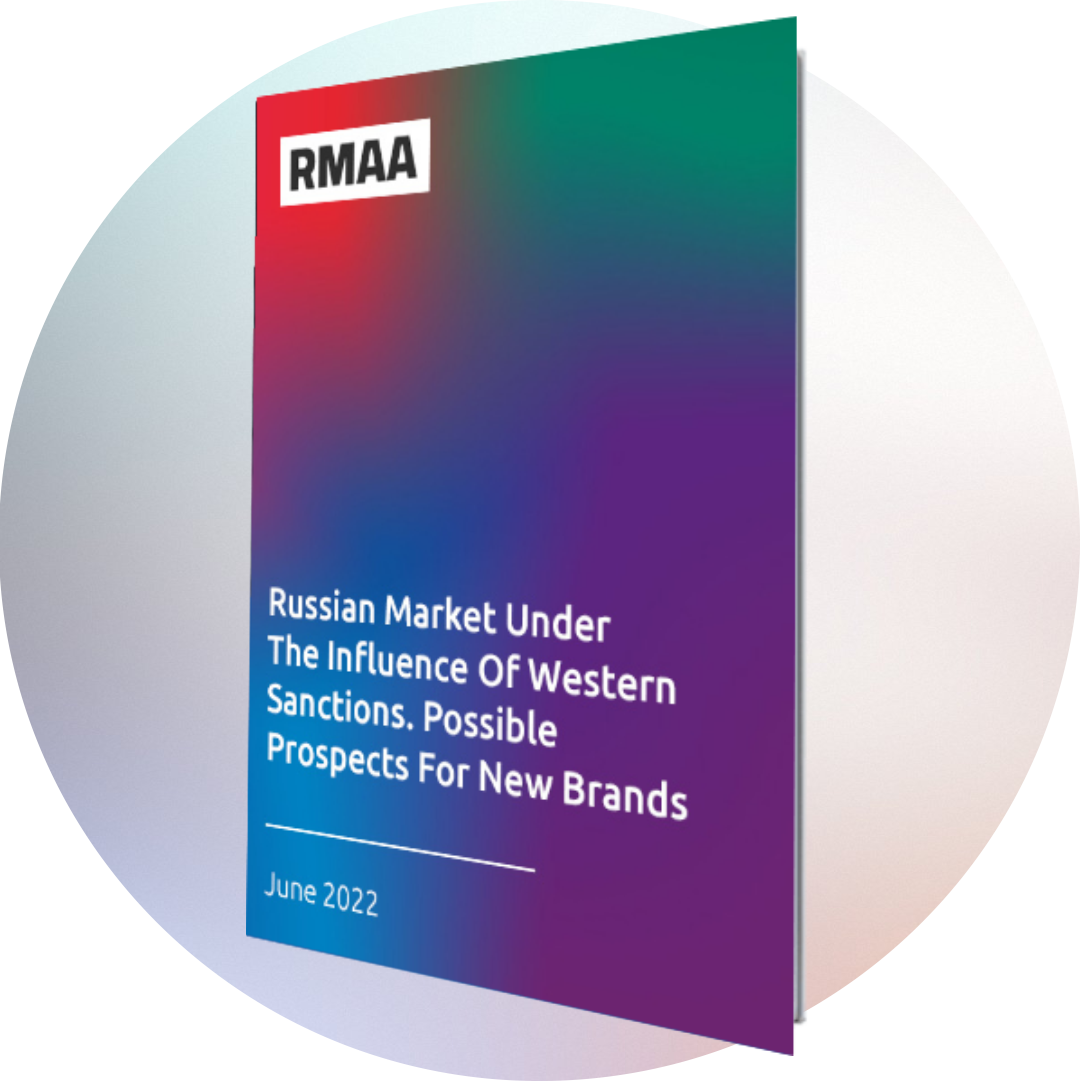Blog about successful marketing strategies in russia
Return to the Russian Market: How Foreign Brands Change Owners and Resume Their Work


B2B MARKETING
Share this Post
Since the beginning of 2022, most foreign companies have suspended their activities on the Russian market. The reason for this was different circumstances related mainly to the tightening of the sanctions policy towards Russia.
This is about approximately 1,000 foreign companies successfully selling their products within the country. When this happened, owners responded differently to the current sanctions. Some brands temporarily stopped their activities (Nike, Coca-Cola Company, Apple, etc.), some companies declared bankruptcy. While other brands have completely left the Russian market.
But with reservations. That is, they left Russia under the current name, having transferred their assets to other owners for further work. Such tendency was evident for many foreign brands.
RMAA experts decided to look into the current situation and figure out the reasons for such actions of most foreign companies the activities of which have become restricted by a number of sanctions within the territory of the Russian Federation.
Learn more from the White Paper Russian Market Under The Influence Of Western Sanctions. Possible Prospects For New Brands.
McDonald's New Life in Russia. Vkusno & Tochka (Tasty and That's It)
One of the first companies that resumed its work in Russia under a new name was the American catering chain McDonald's.
On March 14, 2022, the brand owners made a decision to close all restaurants within the territory of the Russian Federation. After that, on May 16, the company announced that it would exit the Russian market and sell the chain (718 outlets in Russia) to its licensee Alexander Govor. At the same time, McDonald's reserved the possibility to buy the business back within 15 years, as well as indicated a complete rebranding of the chain as a compulsory condition to resume the operation in Russia.
Thus, the first fast food restaurants "Vkusno & tochka" (Tasty and that's it) reopened in Moscow on June 12, 2022, and in St. Petersburg and the Leningrad region on June 22, 2022 under the management of the new owner. Besides, the company is planning to reopen all outlets by September 2022.
The appearance of a new brand on the market has led to only positive results. Firstly, McDonald's reserved the right to return to Russia at any time. Secondly, the new management of the company, having the resources of its predecessor (including a huge percentage of loyal audience), aims for further development on the market.
Of course, following the case of "Vkusno & tochka" (Tasty and that's it), experts anticipate the appearance of other brands on the market that previously belonged to foreign companies.
Who Else?
After the transfer of McDonald's rights to Russian owners, the European company Reebok announced its intention to sell the business. According to Kommersant, on May 12, 2022, the brand's management concluded a deal with the Turkish holding FLO Retailing. As a result of which the new Reebok owner gained the right to manufacture products in 12 countries and more than 100 outlets in Russia. At the same time, the Сoncern is planning to change the name of the stores, but to preserve brand values as maximum as possible.
It should be noted that FLO Retailing has been striving for development in Russia for several years. Since 2021, the company has been independently promoting 5 key brands on the Russian market (U.S. Polo Assn, Lumberjack, Nine West, Polaris and Kinetix). Therefore, the acquisition of Reebok for FLO is another step to strengthen its position in the region.
Another Turkish owner who successfully acquired Russian assets was Arcelik (the leader of the home appliance market in its native region). On June 28, the company purchased Indesit International JSC and Whirlpool Rus LLC owned by the American Whirlpool EMEA S.p.A. As a result, nowadays Arcelik has production resources in the Lipetsk region, allowing it to produce 2.8 million refrigerators and washing machines per year. In addition, there are factories in Kyrgyzstan, Tajikistan, Turkmenistan, Uzbekistan, Armenia, Georgia, Azerbaijan, Kazakhstan, Belarus and Mongolia. Indeed, this deal is extremely profitable for the Turkish company, since the revenue of Virpool Rus in 2021 amounted to about 40 billion rubles and Indesit International - 29.1 billion rubles (Comment: Interfax with reference to the data of the SPARK-Interfax system).
On the other hand, the prompter the company resumes production (which was stopped due to logistics problems, etc.), the faster it will become a leader on the home appliance market. Since most other brands are still limited in its work. At the beginning of June, the largest retailers in this sector reported a reduction in the assortment. In the interview with RBC, Alexey Pogudalov, commercial director of the Holodilnik.ru (Refrigirator) chain of stores, explained that the maximum reduction occurred in categories where the share of European, Korean and American brands was at the highest possible level: dishwashers, ovens and cooktops, built-in refrigerators, televisions, smartphones, certain segments in vacuum cleaners. As for trademarks, Bosch, Electrolux, Samsung, Miele, Dyson and Apple experienced the significant decline in the assortment.
That is, the deal between Arcelik and Whirlpool EMEA S.p.A. in Russia turned out to be one of the most successful during the sanctions period. The first company got the right to work in the Russian region and the opportunity to take a leading market position. While the second one has not turned out to be at a loss due to production downtime since the beginning of 2022. Moreover, the owners of Whirlpool have not risen any demands to change the name or rebrand.
But with the French L'Occitane it was a bit different. Theoretically, the company's name was retained after the transfer of ownership rights to new investors. But actually - now it is written in Russian. On June 16, 2022, Rostislav Kovalenko (31% of shares), the company's CEO and three leading top managers Olga Sabirova, Alexey Shumov and Natalia Milekhina became the owners of the chain of French cosmetics and perfumery stores L'Occitane.
It is worth noting that the brand has stores in major cities of Russia (Moscow, St. Petersburg, Kazan, etc. - a total of 112 retail outlets), as well as an existing online store. On April 15, 2022, L'Occitane was completely closed on the territory of the Russian Federation, but at the end of May they opened under the Russian name "Л’Окситан" (L'Occitane Rus).
Besides the above brands, the following companies turned out to be with new Russian owners: Finnish Fazer (owned by Moscow Bakery and Confectionery Plant “Kolomenskiy"), OBI (MAX group), Valio (GC “Velkom"). Following them, other foreign companies began to think about selling or transferring their assets in Russia.
They Plan to Change the Owner On
March 7, 2022, PVH suspended the operation of all its brands on the territory of the Russian Federation and Belarus. Namely, Tommy Hilfiger, Calvin Klein, Pierre Cardin, Trussardi, US Polo Assn stores, etc. Currently, all these stores are still closed to Russian consumers, however the owners are beginning to think about selling assets to Turkish entrepreneurs. At the same time, the company's main competitor - Inditex (which owns the brands Massimo Dutti, Zara, Bershka, Oysho, etc.) plans to resume work in Russia in June this year.
Another promising asset sale deal may very soon become the American Starbucks. This was told by the company's employees to Vedomosti. According to the source, Anton Pinsky, the founder of Pinskiy &Co, may become the new head of the brand. He will receive the right to lease all brand's coffee shops, but with the condition of full rebranding and without the possibility of using Starbucks products and technologies. It should be noted that in comparison with the case "Tasty - and that's it" such deal has a significant difference. Since the new owner will have to not just rename the brand, but also completely change the production and products of the company. Therefore, experts assess the prospects of this transaction differently.
For example, Irina Kozina, the director of Knight Frank, (in her interview for Vedomosti) argues that the definite benefit of the deal for Pinsky is to obtain long-term lease agreements for premises. And she explains that Starbucks rented premises in places that unite the business and progressive public, therefore, a fashion outlet could open there that could compete with projects such as ABC coffee, Surf Coffee and Doubleby. Mikhail Burmistrov, CEO of INFOLine IA-Analytics, believes that for Anton Pinsky, the acquisition of the large chain is an ambitious project that can become a landmark for the market.
In any case, Starbucks, as Russian consumers were accustomed to see it, will definitely not be the same. However, on the other hand, the possible owner Pinsky will get good prospects for the development of his own projects in the place of the American predecessor. By the way, he already has them: Pinskiy&Co, Avocado Queen, Medusa Cheese Factory, Magadan, Simach, Height 5642, etc. (some of the brands are under the co-management with partner Arkady Novikov ).
Hype Around IKEA
An interesting situation has arisen on the Russian market with the Swedish furniture retailer IKEA. To recap, the brand announced the suspension of work in Russia on March 3, 2022. Which turned out to be not the “happiest” event for Russian consumers, since IKEA products have been successfully sold in Russia for several years. Thus, the revenue of Ikea Dom LLC grew by 27.8% and amounted to 157.3 million rubles in 2021. In the light of such indicators the Head of the Company's division in Russia Pontus Erntell stated that the 2021 was the best year for IKEA in Russia.
However, the brand failed to bypass the sanctions in 2022. In June of the current year, the IKEA press service announced that it would leave and sell all 4 productions in Russia. At the same time, the company's management plans to keep the business related to the operation of the Mega shopping mall (continuing to work normally in 11 cities of Russia).
Meanwhile, several competitors at once expressed the desire to buy IKEA assets. One of them was the Russian Hoff. The CEO of which announced that the company is ready to consider the assets of the Swedish retailer in case of a relevant proposal. And also that it is included in the strategy of development and opening of new Hoff outlets. A little bit later, interest in acquiring the brand's assets appeared in AFK Sistema, which saw in the deal the opportunities for synergy between controlled companies and an industrial holding. Russian furniture chain Tvoi Dom would also like to get IKEA's assets. The head of the PR department, Amina Tagieva, left a comment about this: “We are interested in products that have been the most purchased and in demand for decades. If there are proposals, we are ready to discuss them.” (according to the ”Mall" source).
In other words, IKEA turned out to be a promising investment for many Russian companies to develop their activities on the market. Moreover, some brands benefit from the departure of the Swedish manufacturer and use it for their own purposes. Thus, the furniture manufacturer Mr.Doodrs offered a 10% discount to all customers who have an IKEA customer card.
Left to Get Back
According to majority experts, it was obvious that foreign brands would leave Russia. Because they were simply given no other choice. If such companies did not react to geopolitical changes in the world, they would lose sales volumes in European regions, which are key sources of income for them. Moreover, the disruption of logistics chains and the unsolved so far supply problem resulted in the production failures.
"There are no problems with return — it's just legal manipulations and moves to maintain its presence on the market. Physically, they may be the same people, but de jure it is registered as a management company and that's it, it is not you. And in fact, your head office has a contract with them or some subsidiary. And there are no problems, the transfer of a brand license can also be through a sublicensee. Another thing is that with external management, it is much easier to get back: the conjuncture has changed, the contract for the brand has ended or the management contract has been agreed — and rolled back. Just to sell is a tougher way, and external management is a softer one. What to choose - it depends on each individual corporation and lawyers who work with them and make decisions what actions will be enough not to disclose where the head offices are located." - Yakov Adamov, Managing Partner of Union Media Group, said in an interview with Delovoy Peterburg.
Despite this, no one wants to leave the Russian market. Because the prospect of losing the funds spent on development and promotion looks inefficient for many companies. In addition, if the Russian region is not considered as key one in the premium and luxury segments for European brands, but the situation with the mass market is absolutely opposite. Since Russia and 145 million people living in it, is still one of the largest markets in this sector. And many companies will try to stay in the region, changing the owner or appointing employees from Russian representative offices to the post of company managers.
“It's not difficult to leave, but it's very difficult to return. Especially if so many efforts have been done over previous years: to win the market from competitors or, in principle, to enter it, and then just give it to someone. What for, especially if the company is focused on mass market. AUCHAN, for example, is designed for 90% of our population and they are doing well with sales, the same is true with Leroy Merlin. I think if the situation had normalized, 9 out of 10 companies would have said: "Of course! When to get back?" -Artem Golubev, director of the educational program "Economics“ of the NWIU RANEPA, said in an interview with the newspaper ”Business Petersburg".
In Conclusion
Despite the sanctions restrictions, after which most foreign companies had difficulties to work in Russia, none of them is in a hurry to leave the market. The only difference is that brands approach this issue in different ways. Some sell shares to Russian investors, demanding a full or partial rebranding from them. Others, transfer ownership rights to foreign holdings.
This tells us that the Russian market still has the status of a promising region for the development and sales of products with a huge number of potential consumers (especially in the mass market segment). And a hasty leave may not be a way out of the current political situation, but a serious strategic mistake, entailing significant losses for the company in the future.
At the same time, it should be understood that promotion in Russia requires a strong marketing strategy that takes into account not only current realities, but also other socio-demographic features, the use of certain communication channels, etc. RMAA experts are ready to help you with this by choosing the most suitable and effective means of promoting your brand in order to strengthen your position in the Russian market.
Join 2,000+
of your Peers!
You will be the first to know about Russian marketing insights, news and updates from our agency. Stay tuned!
Get our latest articles delivered to your email inbox and get our exclusive White Paper
"How to sell to Russian large companies?"
for FREE!
Russian Market Under The Influence of Western Sanctions
Find possible prospects for new brands entering the Russian market

Ready to partner with the specialists in Russian marketing and advertising?
About the Author
A content lead. Natalia runs marketing projects promotion with different digital tools in the Russian-speaking market.
Join 2,000+ of your Peers!
Get our latest articles delivered to your email inbox and get our exclusive White Paper "How to sell to Russian large companies?" for FREE!
You will be the first to know about Russian marketing insights,
news and updates from our agency.
Stay tuned!
We're updating our website's design step by step, so some pages may look different. Thank you for your understanding.
Got it














